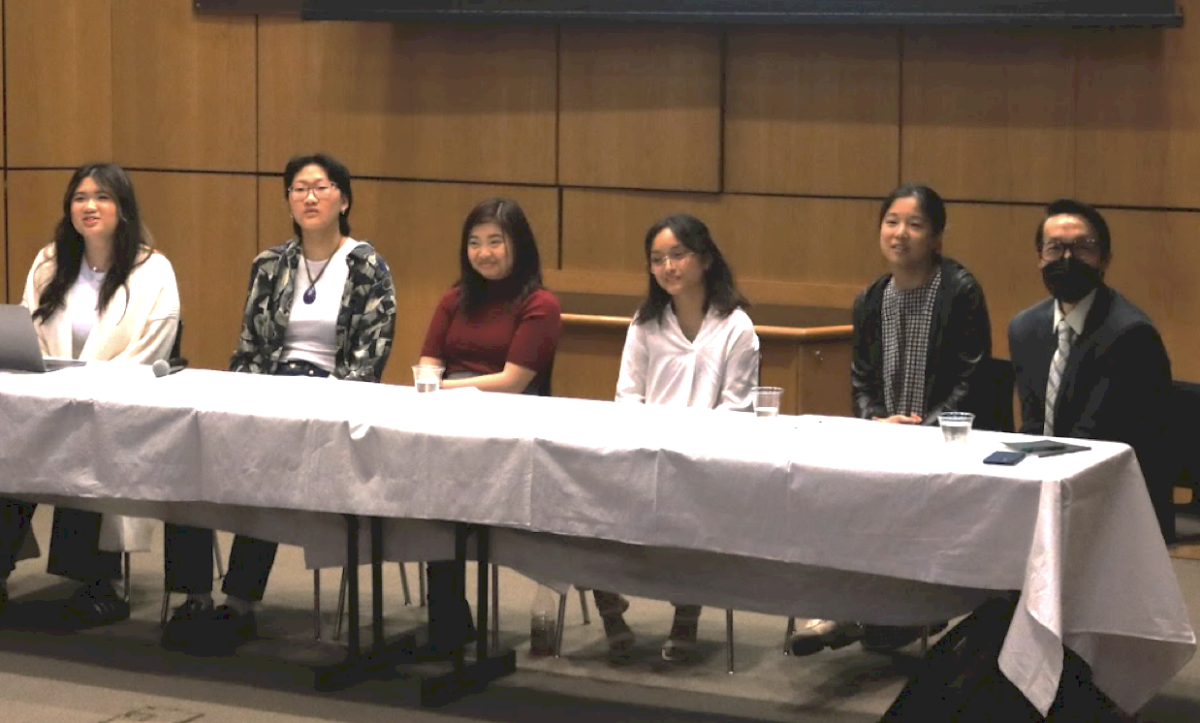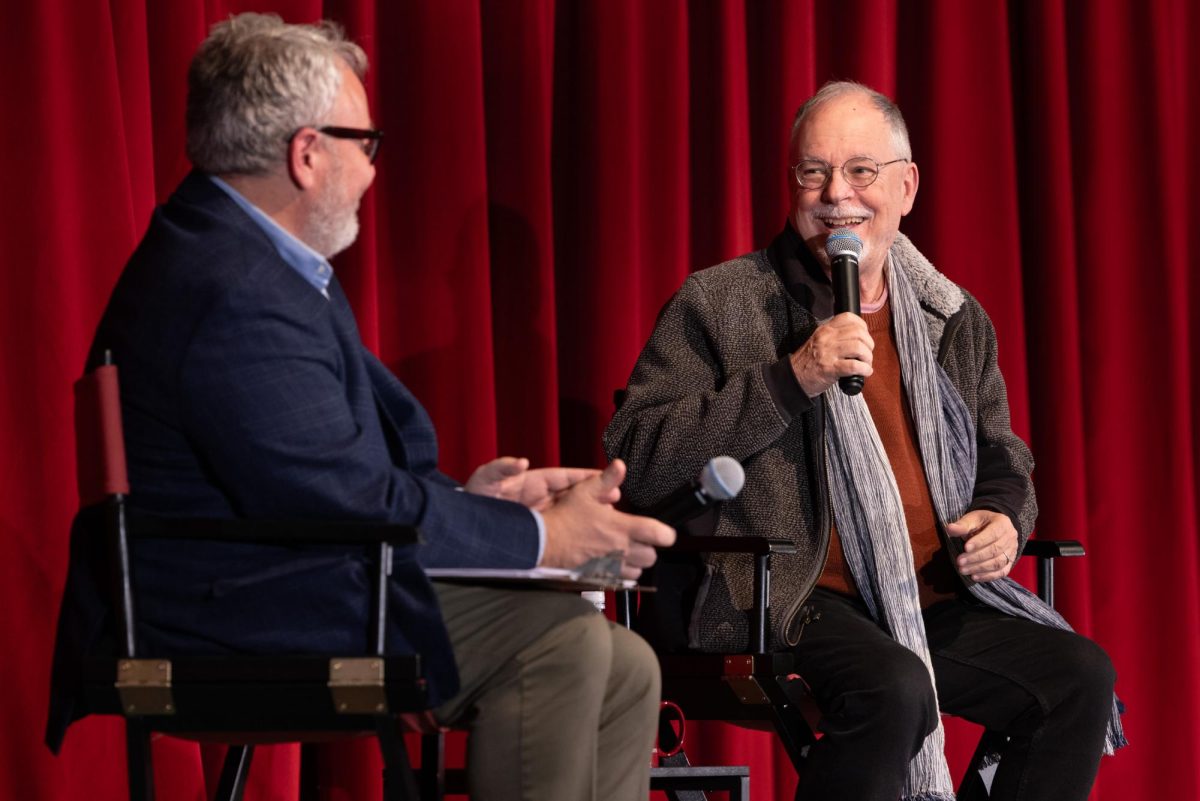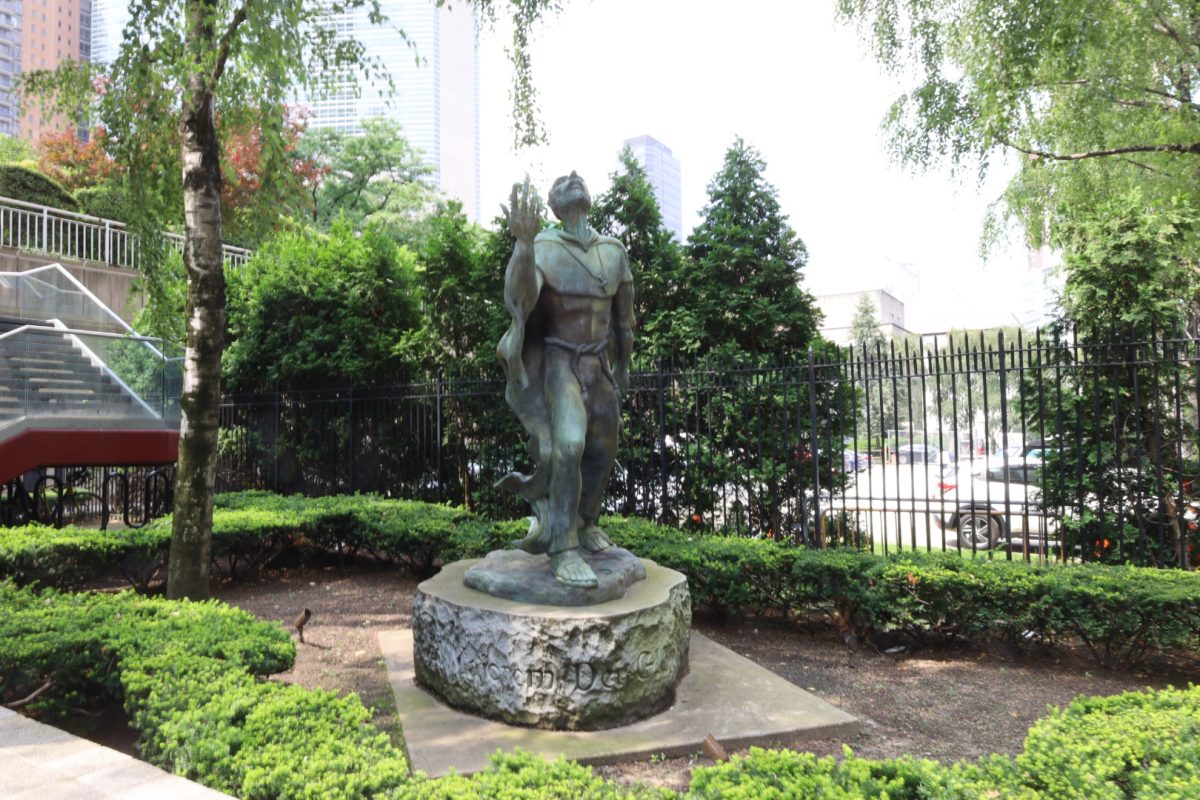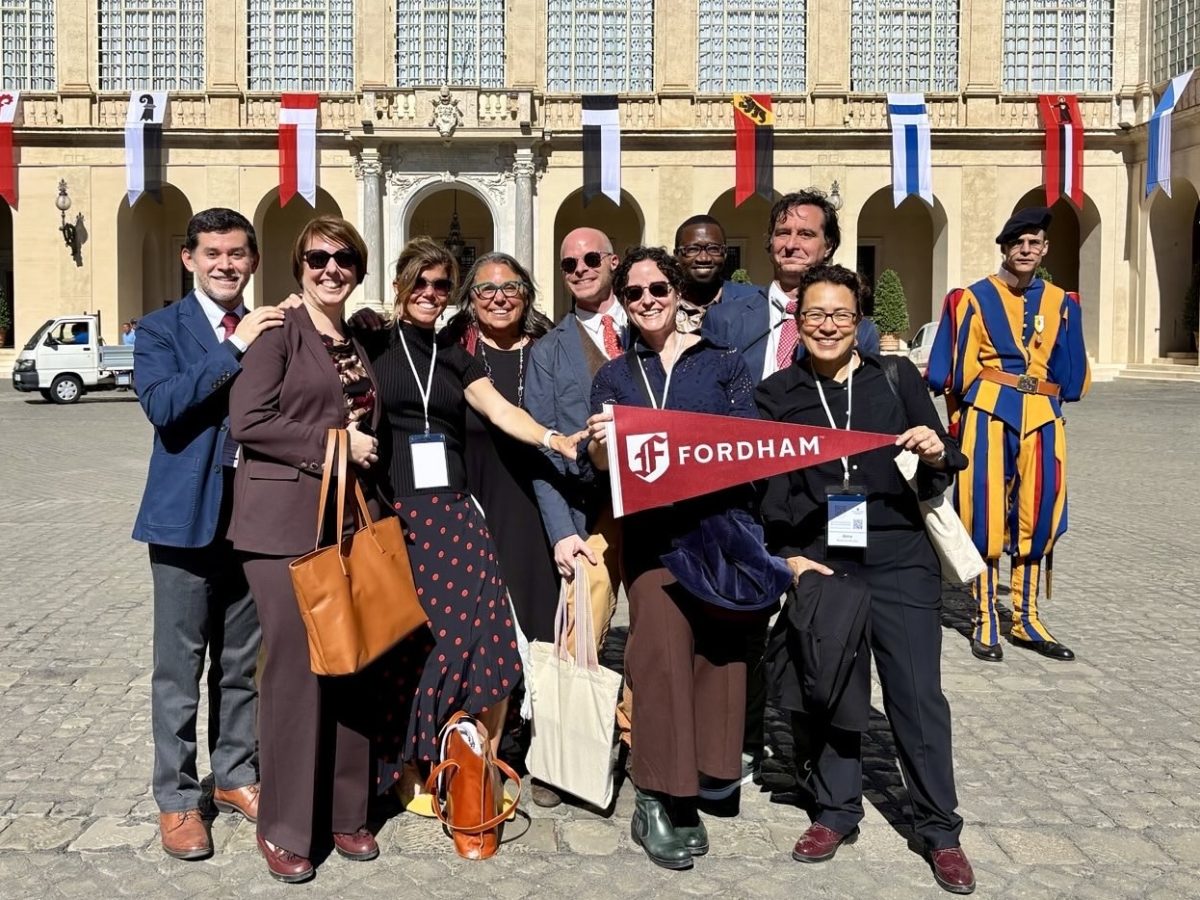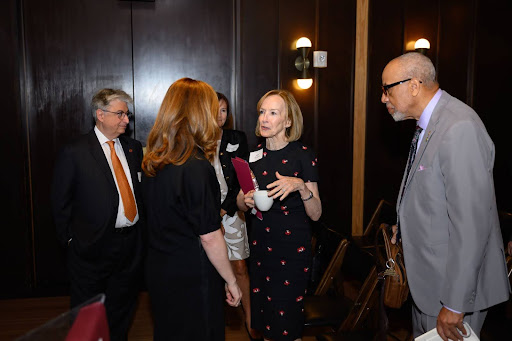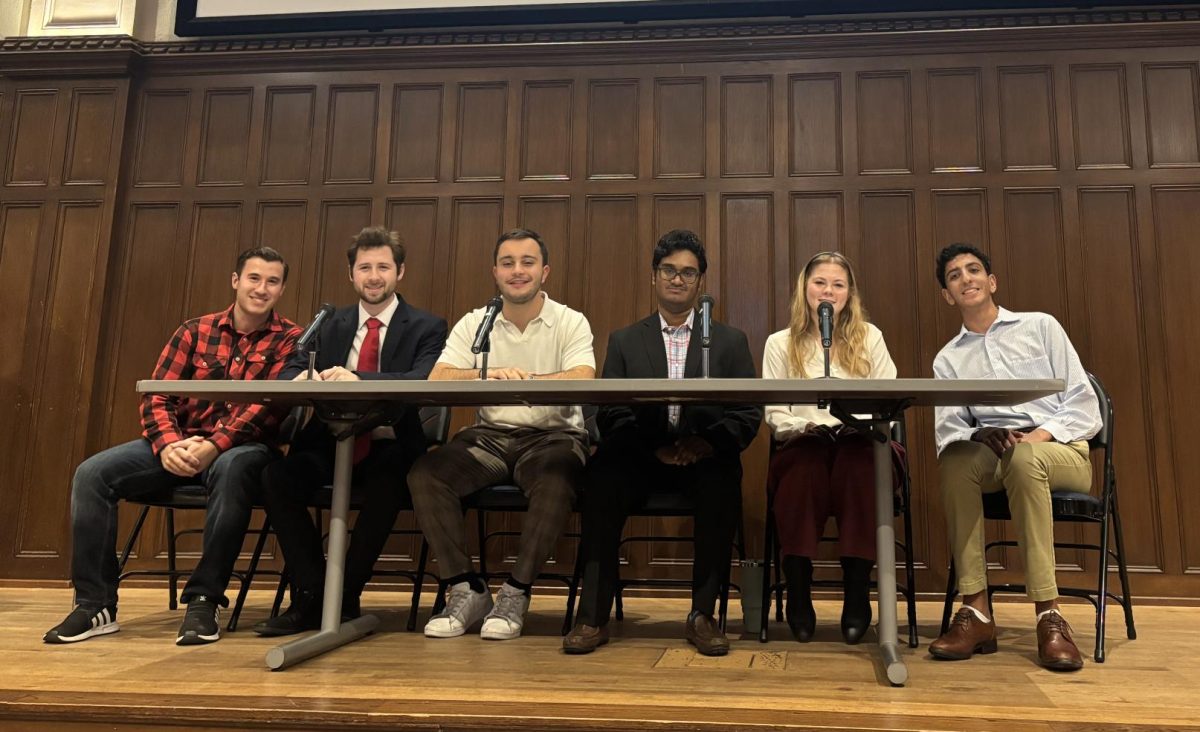Fordham University’s Asian American studies program hosted an event at the Lincoln Center (LC) campus on April 10 to mark one academic year of the program’s new minor. Wednesday’s gathering opened with a roundtable between four students and two faculty members involved in the program and of the Asian, Pacific Islander and Desi American (APIDA) community. The collective shared experiences from their lives and classes and fielded questions from a moderator and 80 audience members. Following their discussion, photographer Tommy Kha delivered a slide lecture on his and his peers’ work.
“What’s been really nice over the course of this event and Kha’s lecture was the idea of bringing people together,” said art history Professor Caitlin Meehye Beach, a co-director of the Asian American studies minor who organized the event. “Celebrating our students, course minors and professors is a really nice way to all connect in this space,” she added. Beach expressed her excitement to meet a wide range of people with a heightened interest in the new minor, which officially launched fall 2023. “It’s exciting to hear our students reflect on what they’re looking forward to with the program, what they’re excited about and what the program means to them.” Beach emphasized the challenges of forming new APIDA connections amidst their individual teaching and service duties and doing so across departments, campuses or fields. “It’s really great to build a community of people who’re all interested in Asian American studies, sharing the same questions and approaching them from different ways and perspectives.”
Aiko Palaypayon, FCLC ’27, a student panelist, is among the Asian American studies minor’s first students. “This program gives us a sense of community and makes us feel seen,” shared Palaypayon. “As a first-gen Asian American college student coming from a predominantly white high school, this program allowed me to make sense of my Asian American identity and conceptualize it while appreciating my ancestors’ stories of what it means to be Asian American in America.” She said that she valued the books she read in her classes on the Filipino American experience, noting her Filipino heritage isn’t discussed in America as often as other cultures are. Despite one book’s age, its story reminded her of her parents, who immigrated to America in the 1990s. “It truly shed light on being first-gen and surviving in America, and was really nice to read about my culture in a class. I didn’t get that in high school, nor did I ever get that growing up. Being able to discuss my culture was nice.” Palaypayon found comfort in others’ appreciation of her culture after years of facing high school microaggressions. “It was really a moment of ‘Wow, it’s gotten to this point where I’m seen, and people see my race and ethnicity,’ and not admonishments of ‘Bad! Why’re you eating that!’ Being in classes with other Asian Americans, I felt our experiences were somewhat similar, yet wonderfully unique.”
Eva Lee, FCLC ’27, also plans to minor in Asian American studies and, like her fellow panelist and classmate Palaypayon, was inspired by the advice of program co-director Dr. Stephen Hong Sohn in his “Introduction to Asian American Studies” course. Lee shared her pride in being part of the program’s inaugural class. “It was very much a happy accident! Seeing the program in its nascent phases is really cool, and I hope this gauges more interest among the student body. This really builds your character — even if Asian American studies doesn’t directly apply to your minor, it forces you to think critically and engage with these issues.” During the panel, Lee highlighted how American history is often exclusively taught from a Euro-American view. “It’s really astonishing when you consider Asians have been in the Americas since the 1500s. Students need that content to begin with.” She discussed how all students should learn APIDA histories, not just APIDA members. “This is a part of American history; you can’t think about race in isolation from other racial groups. You must learn about race in relation to all affected by it. Think across racial boundaries: how all groups think about race, what are their socioeconomic and geopolitical standings in America, why we use the languages we do today, where famous stereotypes come from.”
Lee detailed microaggressions that have been directed at her for speaking out of place and defying bodily expectations. “All those Asian stereotypes are model minority versus yellow peril. In either context, you’re still looked at as this perpetual foreigner. Distancing yourself from that to realize neither is positive, you look at yourself not through the Euro-American lens, but your own. High school was realizing I do criticize myself from another perspective. Coming to college allowed me to realize I can look at myself in a more well-rounded, less critical way.”
Ngoc Vo, FCRH ’24, attended the event. “I liked that many students and professors from different departments came to learn about the program and show their support. A professor in the theater department asked how she could contribute to the program. That really stuck with me.” Vo noted that the co-directors created the program in response to anti-Asian sentiments sparked by the COVID-19 pandemic, such as the 2021 mass shooting in Atlanta. “The Asian American studies program is very promising. I would’ve loved to take their classes!” said the graduating senior. “The interdisciplinary aspect of the program itself allows students to explore the long history of Asians in America and have a deeper understanding of the cultures and identities making up quite a large chunk of the American population.”
Kha’s lecture following the panel discussion opened with a moment of silence in memory of victims of Asian hate. “I do want to take a moment to really think about the victims of Asian American hate crimes in this country that’s still ongoing, and I wanted to reserve space for that.” Kha discussed being Asian and queer while growing up in Memphis, Tenn. “I used a lot of proxies, surrogates and substitutes to relate to instead of ones that weren’t there for me. So how do we arrive at our representation? If I’m going to deal with work and this kind of invisibility, how am I going to deal with that?” Kha shared images that inspired him, including one recreating the opening of the Transcontinental Railroad with descendants of its Chinese laborers. “Identities and self shift and change over time — we never stay at one identity.” He cited his passion for photography as an opportunity for self-validation and documentation. “I love the idea of digging into history; the future always revisits the past. Something about photography makes us time travelers. I’m a cutout of my mother and grandmother. We have to look deeper at other sources to find out contexts and backgrounds and often it crosses into other communities.” Kha said he found difficulty in attracting attention to his work and finding space to be recognized when he began photography. “Part of us existing is a big F.U. to doing things contrary to what we’re told. There’s ‘no market for these things?’ Keep creating and make that market. We’re finding each other in these platforms/spaces and continuing to talk about it. I’m more about being able to make my work at all.”
The panelists offered their hopes for the Asian American studies program’s future. “I’d like a course on the intricacies of Asian American health and the interplay of dopamine and serotonin on how generational trauma can cause changes affecting an individual growing up,” said Palaypayon, who’ll major in psychology. Lee added, “I want to see this develop into a major, and more course offerings relating to all sorts of fields so students can incorporate Asian American studies into their curriculum, and not feel separated from what they’re majoring in. The LC theater director mentioned she’d love to teach an Asian American studies theater class — I got so excited!”
“It will be really exciting to see how the program grows, though there are a lot of challenges in terms of building a program and fundraising support for it to keep things running,” Beach closed. “The most exciting part is, for every class that’s taught, there’ll be students who decide Asian American studies is what they’ll want to study.”



































































































































































































